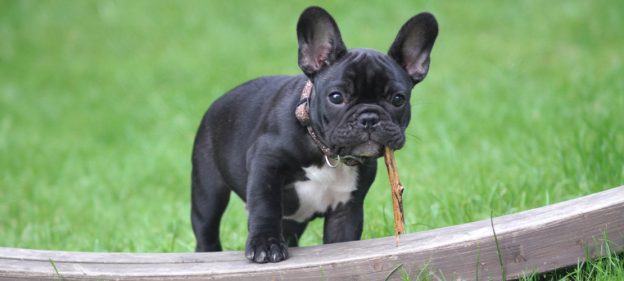We’ve all seen at least one social media influencer or celebrity pose for a picture with their French bulldog. But could an Instagram trend actually be causing more harm than good? This International Puppy Farm Awareness Day, make sure you consider responsible puppy purchasing.
Brachycephalic breeds boom in recent years
In recent years, miniature and brachycephalic breeds (such as the pug and French bulldog) have seen a massive increase in numbers. This could be, in part, fuelled by social media influencers and celebs promoting their dogs on their social media platforms.
BBC Three documentary ‘The Dark Side of Britain’s Insta Puppy Trade’ shared stats showing the breeds which have increased massively in recent years:
- Miniature smooth haired dachshund up by 37%
- Pug up by 110%
- Boston terrier up by 196%
- French bulldog up by 554% (Britain’s fastest growing dog breed)
But, that’s not all, people are now also making Instagram accounts for their dogs; with some accounts having as many as 1.1 million followers. This level of exposure and people more commonly wanting to live the lives of celebs and social media influencers, is only putting these dog breeds in higher demand.
What does the popularity of these breeds mean for how they’re bred?
Since the numbers of ‘on trend’ dogs are soaring through the roof, irresponsible breeding and puppy farming are following suit. With a French bulldog costing anywhere between £1000 and £3000, there’s a lot of money to be made in breeding them.
While some people selling puppies on the internet may be legitimate breeders, it’s really important to ensure that, if you are purchasing a puppy, you do your homework and ensure you either purchase through a reputable breeder or adopt via a rescue centre.
How to spot a false breeder
Some red flags when visiting a dog you’re looking to buy:
- The puppy isn’t with its mother
- There are many different litters of different breeds
- Not all documents are present (e.g. Microchipping documentation)
- The breeder offers to let you take the puppy home before the legal age limit of eight weeks
Puppy farming and bad breeders are becoming harder and harder to spot these days. With some of them even going to the lengths of setting up a ‘base house’ where the puppies are shown to prospective buyers. The base house is set up to look like the ideal environment for the puppy to have been brought up in, alongside its mother.
If you suspect someone is irresponsibly breeding puppies, do not buy the dog in order to ‘save’ it. This will only fund puppy farming further and allow them to continue operating. Instead, report the breeder to the local authorities, police or the RSPCA and spread the news to others in the local area.
Finding a responsible breeder
If you’re looking to buy a dog and want to make sure you’re buying from a responsible breeder, look out for Kennel Club Assured Breeders. The Kennel Club have an up-to-date list of responsible breeders who have to follow a set of guidelines to remain on this list. You can find out more about the Kennel Club Assured Breeders Scheme on their website.
Adopting a dog
It’s important to bear in mind that there are an awful lot of dogs in rescue centres across the UK looking for their forever homes, so please also consider re-homing a dog. Dogs Trust reported that over 47,000 dogs were abandoned by their owners in 2015 alone. Local charities such as Blue Cross, Battersea and RSPCA are always keen for their dogs to find loving homes, so why not give a dog a second chance?

